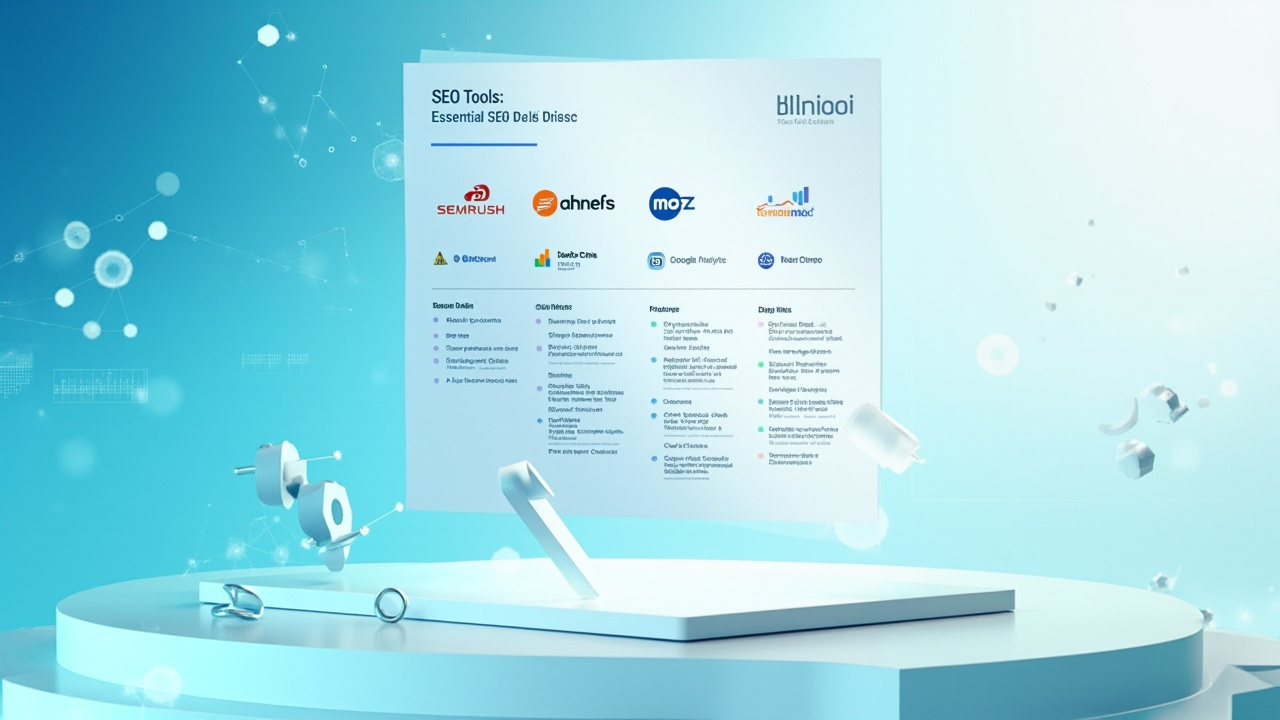In today’s digital world, where visibility is often synonymous with success, mastering the art of Search Engine Optimization (SEO) is crucial for any business or individual looking to make an impact online. The internet is a vast ocean of content, and standing out requires not just skill but the right tools. This article delves into the realm of SEO tools, providing insights into how they can elevate your digital presence. But what happens when software quality becomes as crucial as the content itself? Enter GenQE, an AI-powered solution that enhances software testing, ensuring tools function seamlessly, thus indirectly boosting SEO results.
Understanding SEO: The Backbone of Digital Presence

SEO is more than just a buzzword; it’s the backbone of online visibility. At its core, SEO is about optimizing your online content so that search engines like Google are more likely to show it as a top result for searches of a certain keyword.
What is SEO?
SEO, or Search Engine Optimization, is the practice of enhancing your online content to increase its visibility on search engines. It involves a range of strategies and techniques designed to improve a website’s ranking on search engine results pages (SERPs). These strategies can be as simple as using relevant keywords effectively or as complex as creating a comprehensive link-building campaign.
SEO is not a one-time endeavor but a continuous process that requires regular updates to keep up with the ever-evolving algorithms of search engines. Successful SEO strategies are built on understanding the intricacies of how search engines evaluate websites, which includes factors like relevance, authority, and user experience.
Why SEO Matters
Consider this: over 90% of online experiences begin with a search engine, and 75% of users never scroll past the first page of search results. This statistic alone highlights the importance of SEO. Without it, your business or content might remain invisible to the majority of potential visitors. SEO is not just about driving traffic; it’s about attracting the right kind of traffic that is more likely to convert into customers.
Moreover, effective SEO can boost brand credibility. Users tend to trust websites that appear on the first page of search results. High-ranking sites are often perceived as more trustworthy and authoritative, which can significantly impact consumer behavior and decision-making processes.
The SEO Ecosystem
The SEO landscape is vast, encompassing various components like on-page SEO, off-page SEO, technical SEO, and content strategy. Each plays a crucial role in ensuring that your website is not only visible but also authoritative and trustworthy.
- On-page SEO involves optimizing individual web pages to rank higher and earn more relevant traffic. This includes optimizing the page’s content and HTML source code. Off-page SEO refers to actions taken outside of your website to impact your rankings within search engine results pages. This is primarily driven by backlinks, which are incoming links to your website from other sites. Technical SEO ensures that a website meets the technical requirements of modern search engines with the goal of improved organic rankings. Important elements include crawling, indexing, rendering, and website architecture. Content strategy involves creating and distributing valuable, relevant, and consistent content to attract and retain a clearly defined audience.
“SEO is not about gaming the system anymore; it’s about learning how to play by the rules.”
Essential SEO Tools for Success

In the vast world of SEO, having the right tools can make a significant difference. These tools help analyze, audit, and optimize your SEO strategies to ensure higher visibility and better performance.
Keyword Research Tools
Keyword research is the foundation of any SEO strategy. Tools like Google Keyword Planner, SEMrush, and Ahrefs help identify the keywords that your target audience is searching for. These tools provide insights into search volumes, competition, and potential traffic, enabling you to tailor your content accordingly.
For instance, Google Keyword Planner offers data directly from Google, providing insights into average monthly searches and competition levels for specific keywords. SEMrush and Ahrefs, on the other hand, offer comprehensive keyword analysis, competitor insights, and content suggestions, making them invaluable for crafting a robust SEO strategy.
Utilizing these tools allows you to identify long-tail keywords, which are typically less competitive and more specific, often leading to higher conversion rates. By understanding what your audience is searching for, you can create content that meets their needs and improves your chances of ranking higher.
On-Page Optimization Tools
On-page SEO tools, such as Yoast SEO and Moz, help ensure that your content is optimized for search engines. They analyze various elements like meta tags, headers, and keyword density, providing recommendations to enhance your page’s SEO.
Yoast SEO, for instance, offers a comprehensive analysis of your content, highlighting areas for improvement such as readability, keyword usage, and meta descriptions. It also provides a traffic light system to help you easily identify which aspects of your content need optimization.
Moz offers similar features but with additional insights into page authority and domain authority, helping you understand your site’s standing in the competitive landscape. These tools ensure that each page of your website is fully optimized, improving your chances of ranking higher on SERPs.
Technical SEO Tools
Technical SEO is crucial for ensuring that search engines can crawl and index your site efficiently. Tools like Screaming Frog and Google Search Console help identify technical issues like broken links, duplicate content, and site speed issues, offering solutions to improve site health.
Screaming Frog, for example, is a website crawler that provides detailed insights into your site’s architecture. It can identify broken links, analyze page titles and metadata, and create XML sitemaps, all of which are essential for maintaining a healthy website.
Google Search Console, on the other hand, offers insights into how Google views your site. It provides data on indexing status, search queries, and website errors, allowing you to monitor and optimize your site’s presence on Google.
“The best SEO tools are the ones that save you the most time and provide the most actionable insights.”
The Role of Content in SEO

Content is king in the world of SEO. Without quality content, even the best SEO strategies will fall flat. Understanding how to create content that resonates with your audience and adheres to SEO best practices is essential.
Creating Quality Content
Quality content is informative, engaging, and relevant. It addresses the needs and queries of your audience, providing value that encourages them to stay on your site longer and return for more. Creating such content involves understanding your audience’s pain points and crafting content that offers solutions.
For example, a blog post that provides a detailed guide on how to solve a common problem in your industry can attract a lot of organic traffic. By focusing on providing value first and foremost, you can ensure that your content resonates with your audience.
Additionally, storytelling can be a powerful tool in content creation. By weaving narratives into your content, you can create a more engaging experience for your readers, making them more likely to share your content with others.
Content Optimization
Content optimization involves ensuring that your content is formatted correctly, uses keywords effectively, and includes multimedia elements like images and videos to enhance user experience. Tools like Grammarly and Hemingway can assist in refining your content’s readability and coherence.
Grammarly helps identify grammatical errors and suggests improvements, ensuring that your content is polished and professional. Hemingway, on the other hand, focuses on readability, helping you craft content that is clear and easy to understand.
Incorporating multimedia elements like images, videos, and infographics can also enhance your content’s appeal. These elements can break up large blocks of text, making your content more visually appealing and easier to consume.
The Impact of Content on SEO
Search engines prioritize content that provides the best answers to user queries. By consistently producing high-quality content, you improve your site’s authority and increase its chances of ranking higher on SERPs.
Content that is regularly updated and relevant to current trends is more likely to be shared, increasing its reach and improving your site’s visibility. Additionally, high-quality content can attract backlinks from other reputable sites, further boosting your SEO efforts.
“Content is where I expect much of the real money will be made on the Internet, just as it was in broadcasting.” – Bill Gates
Leveraging Analytics for Informed SEO Strategies

Analytics provide the data-backed insights needed to refine and enhance your SEO strategies. They help track performance, identify trends, and uncover opportunities for improvement.
Understanding SEO Metrics
Key SEO metrics include organic traffic, bounce rate, conversion rate, and keyword rankings. Tools like Google Analytics and SEMrush provide detailed reports on these metrics, enabling you to gauge the effectiveness of your SEO efforts.
Organic traffic measures the number of visitors that reach your site through non-paid search results. A high level of organic traffic indicates that your SEO strategies are effective in attracting visitors. Bounce rate, on the other hand, measures the percentage of visitors who leave your site after viewing only one page. A high bounce rate often suggests that your content is not engaging or relevant to your audience.
Conversion rate measures the percentage of visitors who complete a desired action on your site, such as filling out a form or making a purchase. This metric is crucial for understanding how well your site converts visitors into customers.
Using Data to Drive Decisions
Data-driven decision-making is crucial for SEO success. By analyzing metrics, you can identify what’s working, what needs improvement, and where there are gaps in your strategy. For example, if you notice that certain keywords are driving more traffic than others, you can focus on optimizing content around those keywords.
Similarly, if you observe that your bounce rate is high, you can investigate potential causes, such as slow page load times or irrelevant content, and make necessary adjustments. By using data to inform your decisions, you can ensure that your SEO strategies are as effective as possible.
Predictive Analytics in SEO
Predictive analytics involves using data, statistical algorithms, and machine learning techniques to predict future outcomes. In SEO, it can help anticipate trends and adjust strategies accordingly, ensuring that you remain ahead of the competition.
For example, by analyzing search trends and user behavior, you can predict which topics are likely to gain popularity and create content around those topics before your competitors do. Predictive analytics can also help you identify potential risks, such as changes in search engine algorithms, allowing you to proactively adjust your strategies.
“Without data, you’re just another person with an opinion.” – W. Edwards Deming
The Intersection of Software Quality and SEO

While content and keywords are essential, the quality of the tools and platforms you use also plays a significant role in SEO success. Poor software quality can lead to technical issues that negatively impact your site’s performance and ranking.
The Importance of Software Quality
High-quality software ensures that your website runs smoothly, without glitches or downtime. This is crucial for maintaining user satisfaction and avoiding penalties from search engines. A site that frequently crashes or loads slowly is likely to frustrate users, leading to higher bounce rates and lower rankings.
Additionally, search engines like Google take site performance into account when determining rankings. A site that is optimized for speed and performance is more likely to rank higher on SERPs.
GenQE: Enhancing Software Quality
Incorporating tools like GenQE into your software development process can enhance quality by leveraging AI to optimize test automation and reduce manual effort. GenQE’s AI-driven test generation and smart test execution help identify and prioritize critical areas for testing, ensuring that your website functions seamlessly.
By utilizing GenQE’s self-healing automation, you can minimize maintenance efforts and reduce downtime, ensuring that your site remains operational and efficient. This not only improves user experience but also enhances your site’s SEO performance by reducing potential technical issues.
The Impact on SEO
By ensuring software quality, you indirectly boost your SEO by providing a better user experience, reducing bounce rates, and maintaining high site performance. This holistic approach to SEO is essential for long-term success.
A site that is fast, reliable, and user-friendly is more likely to attract and retain visitors, leading to higher engagement and conversion rates. By integrating quality software solutions like GenQE into your SEO strategy, you can ensure that your website is equipped to handle the demands of modern users and search engines.
“Quality in a service or product is not what you put into it. It is what the client or customer gets out of it.” – Peter Drucker
Case Studies and Real-World Applications

Understanding SEO tools and strategies in theory is one thing; seeing them in action is another. Here, we explore real-world applications and case studies that highlight the effectiveness of SEO when combined with quality software solutions.
Successful SEO Campaigns
Examine how companies like HubSpot and Airbnb have successfully leveraged SEO tools and strategies to dominate their respective markets. HubSpot, for instance, uses a combination of content marketing and SEO to attract and engage their audience, resulting in significant organic traffic and lead generation.
Airbnb, on the other hand, utilizes a robust local SEO strategy to target specific markets and enhance visibility for their listings. By optimizing their content for local keywords and creating location-specific landing pages, Airbnb effectively captures the attention of potential travelers searching for accommodations.
These stories provide valuable insights and lessons for businesses of all sizes, demonstrating the power of combining strategic SEO practices with high-quality content.
The Role of GenQE in Real-World Applications
Explore how GenQE has been utilized by companies to enhance their software quality, indirectly contributing to improved SEO performance. For example, a tech company implementing GenQE’s AI-powered platform reduced their testing time by 50%, allowing them to release updates faster and maintain a competitive edge.
By ensuring that their software is free from bugs and technical issues, these companies not only improve user satisfaction but also enhance their site’s SEO performance by minimizing factors that could negatively impact rankings.
Lessons Learned
From these case studies, we learn that a multifaceted approach, combining SEO tools with quality software solutions like GenQE, yields the best results. It underscores the importance of not only focusing on content and keywords but also ensuring the platforms you use are up to the task.
By embracing innovative solutions and continuously refining your strategies, you can achieve sustained success in the ever-evolving digital landscape.
“Success usually comes to those who are too busy to be looking for it.” – Henry David Thoreau
Conclusion: The Future of SEO and Software Quality

As the digital landscape continues to evolve, the importance of SEO and software quality cannot be overstated. Both are integral to building a successful online presence that not only attracts visitors but also converts them into loyal customers.
In conclusion, while SEO tools are indispensable in crafting a robust digital strategy, equally important is the quality of the software and platforms that underpin these efforts. Tools like GenQE offer innovative solutions to enhance software quality, indirectly supporting your SEO objectives by ensuring a seamless user experience.
Optimizing both your SEO and software quality strategies will position you for sustained success in an increasingly competitive digital world. As you explore the various tools and solutions available, remember that integrating a comprehensive approach will yield the best results.
Explore the tools and strategies discussed to unlock new levels of digital success.
Discover More Innovative Solutions
Want to learn more about the tools and technologies discussed in this article? Explore how these innovations can be tailored to your specific needs and workflow requirements.
Our team of experts is available to answer your questions and provide personalized insights into how modern solutions like GenQE can address your specific challenges.
If the link above does not work, please visit: https://calendly.com/dm-csimplifyit/30min?month=2025-05